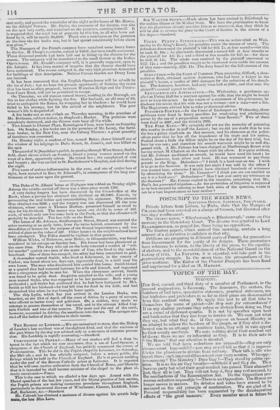USURY. PERE Y v. FITZGERALD.—This was an action tried on
Wed- nesday in the King's Bench, for penalties under the statute of usury. The defendant discounted the plaintiff's bill for 64/. 7s. at fnur months—for this he took 4/, 10s. ; he afterwards discounted a second bill at four months to the plaintiff for 44/. 7s. ; and a third at five months for 62/. 5s.—for these he took 81. 12s. The whole sum received by the plaintiff amounted to 157/. 17s.; and the penalties sought to be recovered were treble the amount of that sum—namely, 473/. 1 ls. The Jury found for the full amount of the penalties. SE nucinoN.—In the Court of Common Pleas yesterday, Gifford, a shoe- maker at Bath, obtained against Anderson, who had been a lodger in the - plaintiff 's house, a verdict of 500/. damag,es for the seduction of his daugh- ter. The damages, howgver, had only been laid at ;3001., and that suns the plaintiff's counsel agreed to take. Ex T It AO RD I N MIX A PPLICAT I 0 N.—On Wednesday, a gentleman ap- plied at Union Hall for a warrant against his wife, that she might be bound
over to keep the peace.. In the course of a statement of his grievances, he disclosed the secret that his wife was not a woman—nor a man—nor a fish. The Magistrates advised him to take professional advice.
POISONED PORTER.—In the Court of Exchequer on Wednesday, three publicans were fined in heavy penalties for weakening and adulterating porter by the use of a preparation termed "beer flavour." Two of them were fined in 4001., and the third in 2001. THE FIRE KING.—We certainly did not see the necessity of poisoning this worthy in order to puff the Lance!; but we did not doubt that lie was the less a paltry charlatan out that account, and his clamours at the police-
offices prove that he has all the impudence of his trade and his nation. Pushed about a little the fellow might be on the day of his fiery trial, but hurt he was not ; and therefore his assault warrants might be as well dis- pensed with. A Mr. Fulvoye has been charged at Marlborough Street with having struck M. Chahert on the breast with his elbow. It is quite evident, had Mr. Fulvoye meditated an assault, he would have used his hand ; he denied, however, both elbow and hand. He was sentenced to pay three pounds to the King. Defendant—" I think it a hard case on me. I wish
it to go to the Sessions. It was only last night I was told by the officer I was wanted here, otherwise I might have obtained hundreds of witnesses by advertising for them." Mr. Conant—" I think you are not entitled to say it is a hard case." Defendant—" May I not now carry my witnesses to the Sessions ?" Mr. Conant replied in the negative, remarking that Mr. Peel's Act prevented aligation.—As the prevention of litigation is supposed to be best secured by refusing to hear both sides of the question, would it not be a vast improvement to hear neither ?


















 Previous page
Previous page